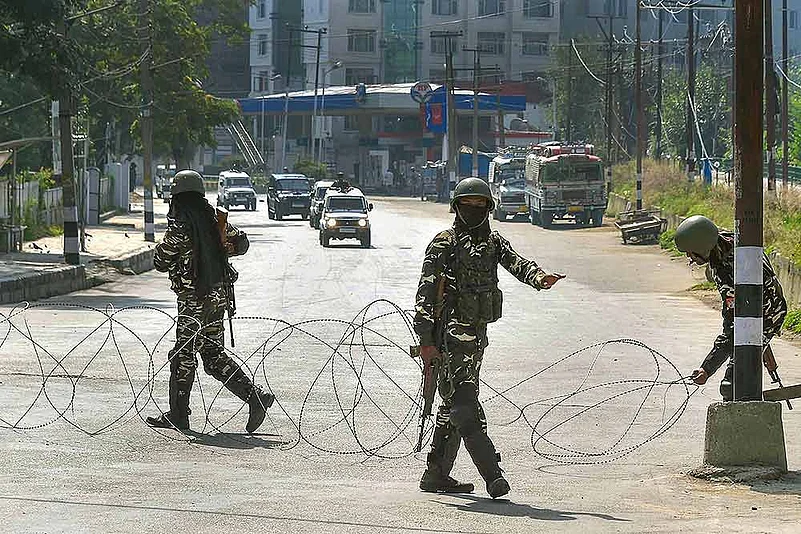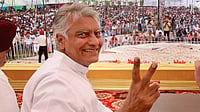Annie Raja, the General Secretary of the "National Federation of Indian Women" (NFIW), was one of the members of the all-women team, which visited the Kashmir valley from September17-21 to assess the situation after the centre scrapped Article 370. The five-member rights activist team submitted a detailed report after visiting several villages and speaking to hundreds of people in the valley. Narrating her experience, Raja says that Kashmiris want "azadi" and they are neither with Pakistan nor with India.
Excerpts from the interview:
Q) Kashmir is under lockdown for more than 50 days now. What's the sense you are getting after visiting the valley?
The abrogation of article 370 has united the people of Kashmir, and they said in one voice that we want "azadi". They don’t want to be with Pakistan or with India. They say that they will decide on their future.
Another thing I noticed is the people are pinning their hopes on September 27, when Prime Minister Modi and Pakistan Prime Minister Imran Khan will speak at the UN Assembly.
Q) How did they come to know that Prime Ministers of India and Pakistan will speak in the UN Assembly on September 27? What if nothing comes out of the talks?
I have no idea how they got this piece of news. But everyone -- from old to young -- are hoping that some positive news will emerge from the UN Assembly. We heard it from the people in the north, south and in Srinagar too. However, we know that nothing is going to happen. But I am worried that all hell will break loose if their expectations are not met. They were silent and lying low all these days. If that frustration leads to some sort of revolt, it will have calamitous consequences...
Q) Do you feel that some sort of frustration is building up after more than 50 days of communication blackout?
People are saying enough is enough. Their morale is up. Most of the people I spoke to told me that 'If the situation continues, they are ready to fight back'. One young girl told me that “you fought for the independence of India, now it’s our turn to fight for the independence of our own state”. Alienation was always there and now it’s complete.
Q) The Army Chief on Wednesday said there is normalcy in Kashmir and people are moving around on their work.
Public transportation is zero in the state. One could occasionally see private vehicles on the road, that too, for emergency purposes. There is no work happening and people are surviving on stored food items. Communication blackout was complete. We saw a few STD booths and long queues of people to make calls. They were very emotional while talking to their children or relatives who stay outside. We visited many hospitals and got reports from doctors and nurses too. Patients, especially pregnant women, are suffering a lot because of the lack of communication and transport. In many cases, its delayed delivery and there are lot of complications. Many miscarriages are happening because of mental trauma, say doctors.

Activists Syeda Hameed, Annie Raja, Poonam Kaushik, Kawaljeet Kaur and Pankhuri Zaheer release a report on the situation in Kashmir Valley during a press conference in New Delhi.
Q) The government claims the situation is under control because there are no reports of deaths or violence after the lockdown.
The government should talk about the deaths caused by the absence of communication and transportation. That’s also a state-sponsored death. People are losing their lives because they are not able to get timely medical help. According to reports provided by doctors, many people are committing suicide because of depression. When we were at the hospital, we saw a suicide case out of depression. We also saw young girls suffering from depression and doctors told us that it’s become a regular affair now.
Q) In your report, you said that child detentions are a worry. How bad is the situation?
According to reports available to us, 13,000 plus young boys between 13- 28 years of age have been picked up and put in jail. We also spoke to mothers whose sons were picked up by the army. Mothers are furious and they are frantically looking to locate the children. Women say that when their children step out of the house, it feels like "this could be the last time we are seeing them". Everyone is equally grieving and affected. There was a woman, whose two children — 14 and 17 years old -- were picked up by the police. They sent the 17-year-old back because of some injuries but kept the younger one. The mother has gone to the army camp and even the central jail to look for him but in vain. Many names are missing in the lists. The army doesn’t have any idea whether the children are in Rajasthan jail or UP or some other place.
Q) How did the people in Kashmir react to your team?
We have interacted with students, teachers, professors, doctors, farmers, housewives, young people, NREGA workers including, J&K police and even few army men. Kashmiris have no clue about the happenings outside their world. They think that the rest of the country is against them. Initially, it was difficult to open a dialogue with them.
They used to first lash out at us and all. When I told them that I am from Kerala, they slowly opened up. They believe that south Indians are educated and they understand issues better.
Q) Have they come to terms with the removal of Article 370 and the state turning into Union Territories soon?
Their immediate reaction was “Article 370 is like oxygen for us”. They feel that this was the last blow and it’s impossible to forget and forgive. They are not yet ready to accept that the state will turn into union territories.
Q) You said that Army is everywhere...
People are scared. The army will encroach into your house and will do anything. Women openly told us that they have been molested by the army. They loot their houses too. Some people told us that army people even poured kerosene on their paddy harvest.
Q) Do you see any solution in sight?
The political process has come to a halt in the state. No dialogue is happening. I don’t know how the government is going to solve the issue.


























